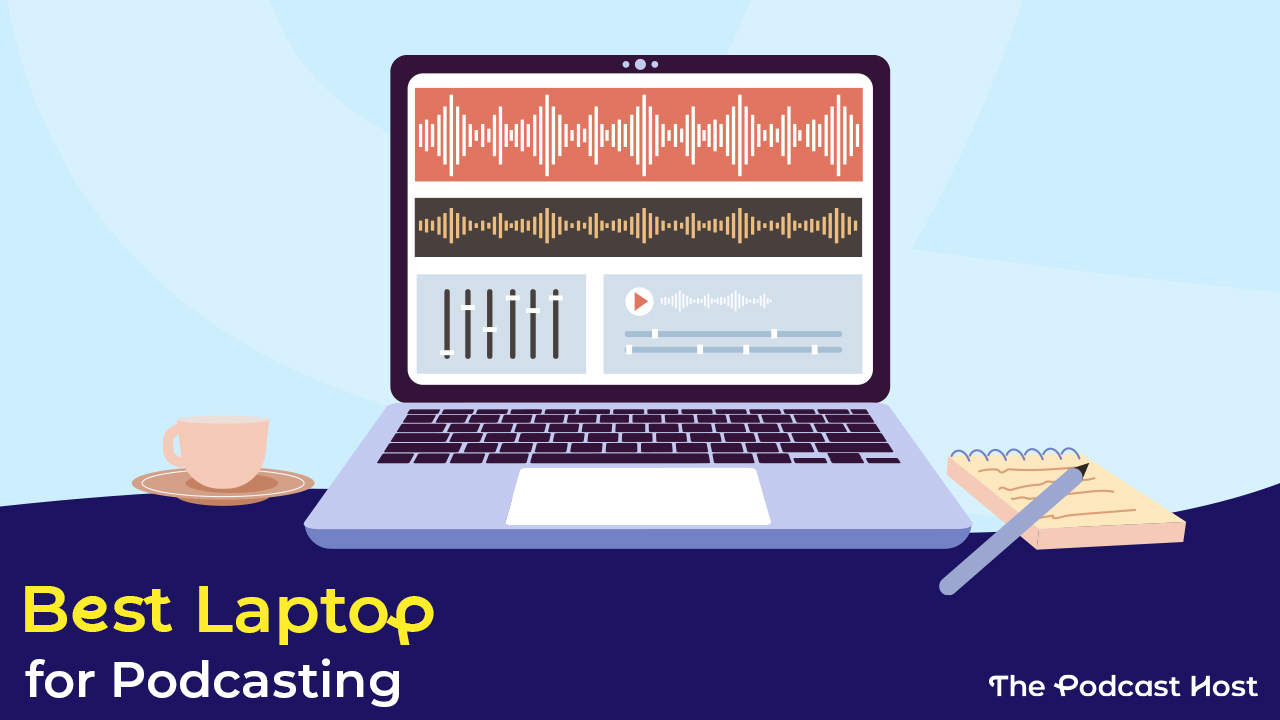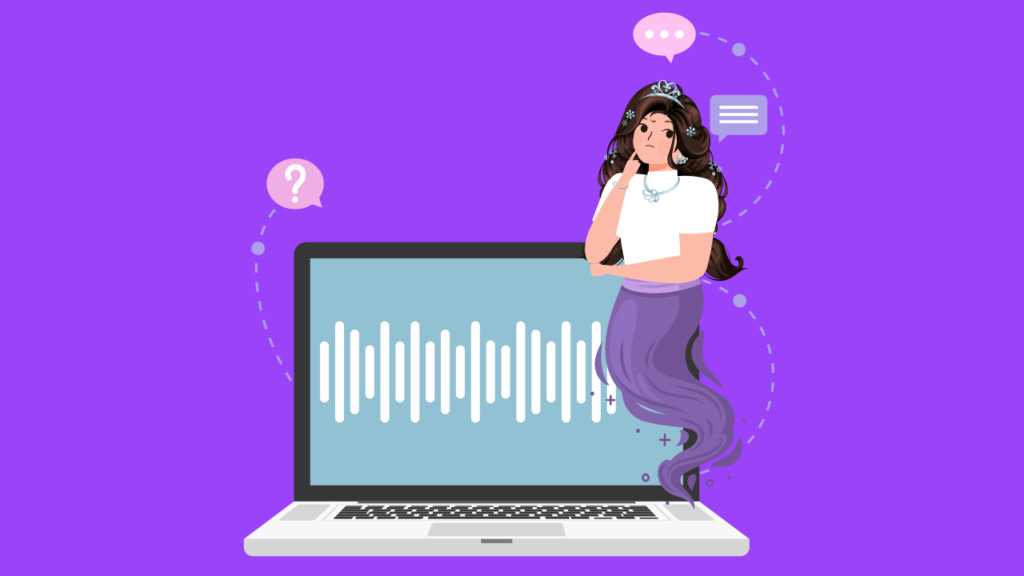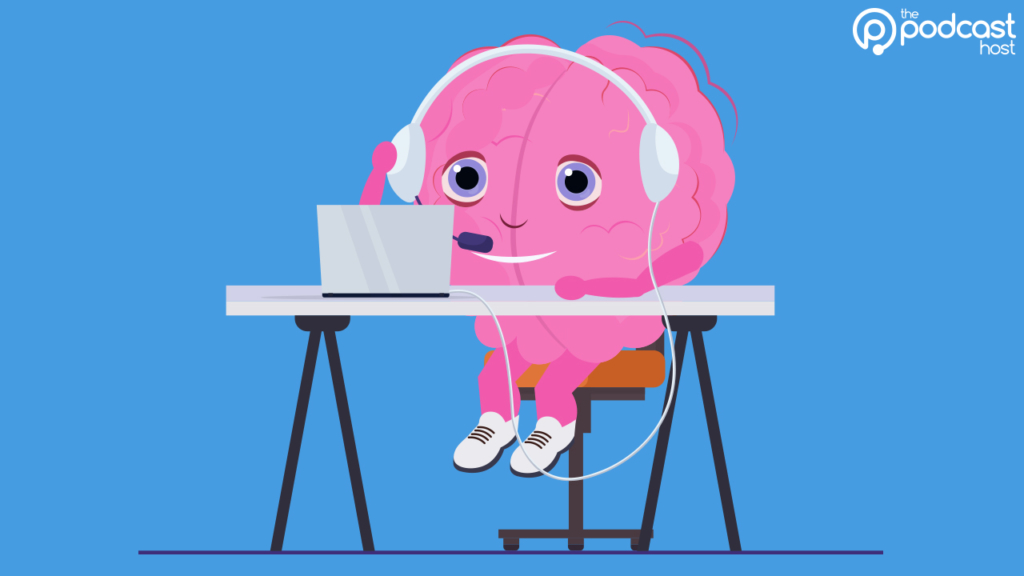What’s the Best Laptop for Podcasting?

We’ve already covered all you need to know about buying a computer for podcasting. But what about laptops for podcasting, specifically?
Laptops are compact, mobile, and can offer similar specs to introductory PC computers. Our best computer article is worth a look, (even if you’re in the market for a laptop) because it also covers hardware specs and what it all means. All that information will be relevant for laptops too.
This ‘best laptops for podcasting’ run-through is aimed at helping you weigh up your options before you make that purchase!

What am I Looking for in a Laptop for Podcasting?
The brand doesn’t really matter. It’s what’s under the hood that counts.
At a minimum, I would recommend 8GB of RAM, quad processor (Intel or AMD, that doesn’t matter) with a base speed of 2.6GHz.
Laptops typically come with “bloatware” that is proprietary to the company you are buying from. Some serve a useful/crucial purpose… some, not so much. Pre-built PCs have this to an extent, and custom-build PCs have minimal.
How Does a Laptops Differ From a Desktop PC?
There are unique parts specific to laptops such as trackpads, battery, built-in keyboard, and manual extra fan controls (more on gaming laptops). Each feature that is required for the laptop to function eats up a piece of the finite resources, on top of the operating system itself (including Wifi and Bluetooth functionality), before you even install an extra piece of software!
At a minimum, for podcasting, you will be using a DAW, USB mic or an interface/XLR microphone combo. The DAW software and drivers for either a USB mic or for the interface all eat into the resource pool shared by everything else.
Here’s an Example…
The laptop I am using to write this article with is a quad-core 2.7GHz (Processor) with 8 GB of RAM. Running the machine idle uses 30% of my RAM. Adding a word processor and a browser with one tab open, with no extensions, jumped it up to 41%!
This is just food for thought – you need to be a bit more resource-aware on a laptop.

Can I Use a Gaming Laptop to Podcast?
Yep, this can be a great choice!
If you don’t want to spec out a laptop yourself, you can always opt to invest in a gaming laptop. Not necessary by any means, but you won’t have to worry about performance issues for podcasting when it’s under a higher load of processing. These machines are built to perform FAST and most come with SSDs now (solid state drive – ie. a super-quick hard drive). An SSD will greatly improve the performance of a laptop.
These are a bit more expensive. “Budget-friendly” gaming laptops still start at around $800.
What Gaming Laptop Should I Buy?
These laptops below should get you what you need. At the bottom of the page via each link there is a comparison chart for similar options.
A quick heads up that we use affiliate links which means we may earn a commission should you choose to buy through them – never at any extra cost to yourself.
Upgrading a Laptop for Podcasting Purposes
Sometimes you can upgrade parts in a laptop. Here, you might pick up a cheaper model and swap out certain parts. If you want to go this route you’ll want to make sure that the CPU is good quality as this is one component that usually cannot be swapped. Remember, look for minimum quad-core 2.6GHz.
It can be cheaper to swap out an HDD for an SDD (I recently did this for $100) and sometimes RAM can be replaced. As a personal preference of mine, I would try an SSD swap in first to see how much better the machine runs before mucking with RAM.

Editor’s Note
Please ensure that a laptop is able to be altered this way. Some cannot. If you’ve never done this before, consult your local computer store to see if a laptop is able to be upgraded, what parts are compatible, and installation assistance, as much can go wrong.
Entry-Level Laptops for Podcasting
You can most definitely opt-in for an entry-level laptop, depending on the software you use to podcast (more on that below!). These usually start around $300.
If going budget, then try to look for at least 8GB of RAM, and a quad processor with a base speed of 2.6GHz. This has become more common in entry-level laptops but it might mean you have an HDD, rather than an SSD. Having an HDD as the laptops’ hard drive can sometimes result in buffer issues (clicks, pops, and sometimes dropouts in a recording) as it’s not taking full advantage of a CPU’s speed.
Here are a few things to think about, if you’re podcasting on a more budget laptop:=
- Use a fully-online recording and editing solution like Alitu. This is browser based, and requires a much less powerful laptop to run.
- Or opt for a lower resource recording package like Audacity or Reaper.
- Save often (you should anyway)
- Set up back save files when able in your recording software
- Only run what is absolutely necessary (you may not want to have 10+ tabs open in your browser while recording!)
Recommendation-wise, these should get what you need based on specs.
Please note that sometimes in these budget-friendly laptops, if you do get an SSD drive, then the hard drive disc space can be pretty low (128GB). In this case, you’ll need to use an external hard drive for storage. You’ll need to do some research to find that balance of performance spec and storage.
Can I Podcast on a Chromebook?
Chromebooks have become increasingly popular over the past few years. They can be great value laptops that are still quick and slick to work on.
The trouble is they have their own operating system, which is neither Windows nor Apple OS, so quite a few standard audio editing packages wont run on them. For example, the entire Adobe suite can’t run on a Chromebook, so that counts out Audition as an editing package.
The easiest solution to this is to go with a browser-based recording and editing package. These are often optimised for the Chrome browser – being the most popular on the market – and so they run perfectly on Chromebooks.
One option is The Podcast Host’s Podcast Maker app, Alitu, which includes call recording, audio cleanup, audio editing, episode building and podcast hosting. That’s everything you need to run your show, and it’ll all work perfectly on a Chromebook.
There are alternatives, too, all of which work great in a browser. For a full roundup, read our Best Podcast Maker Apps guide.
Cooling Solutions Specific to Podcasting
This is super important in a laptop, particularly when you’re working on heavy media-based processes. The warmer the internal temperature the more likely the machine’s performance capabilities can be “throttled”, aka: unable to perform at peak performance. Any time a laptop comes under a heavy load using lots of processing power to run, the internal temperature will increase. Recording and editing are prime examples that cause temperature spikes.
To lessen this you may need to:
- Swap out better cooling paste for the CPU – the stock out-of-box paste sometimes isn’t the greatest and, over time, degrades
- Place the laptop on cooling pad
- Ensure the fan vent isn’t blocked
- Occasionally clean out dust internally with compressed air



Editor’s (Super Important!) Note
Please ensure your CPU can be accessed to change the cooling paste. Consult your local computer store for assistance so you don’t break anything! A Laptop’s internal parts are very delicate and what you can do with them varies by model and manufacturer!
Noise
Whether you get a gaming laptop or an entry-level one, the internal fan is going to ramp up creating a significant level of noise. Noise and audio do not mix well! But, luckily for you, laptops are mobile! If you’re adding fans and cooling pads to protect the health of your machine you can always have a longer cable run. This won’t work with a USB mic setup, however.
If you are using an interface/XLR mic combo, it is much easier to put space between you and the laptop to let the cooling protection do its thing. You can set your recording levels and control the computer wirelessly with a keyboard, mouse and via a tablet as a silent display.


Conclusion
I can’t recommend an extensive laptop list for podcasting since there are hundreds of models to pick from. I am partial to MSI having used them for years and my current laptop is 6 years old from them before needing to upgrade parts.
With the information in this article, you should be better equipped to make a decision on which route you can take based on your personal needs and budget. Use user reviews, as well, and you should be able to narrow down the perfect laptop for your podcasting needs.
And once you’re kitted out with a new laptop, don’t forget to take a look at our ultimate guide to podcast software – that’s where you’ll find every option for recording, editing, and publishing your audio.
Happy podcasting!
